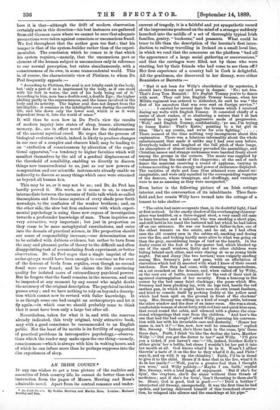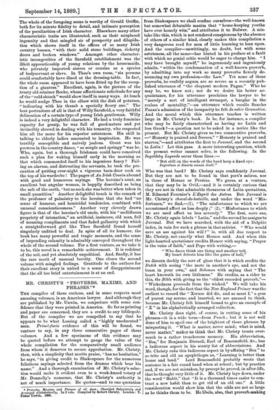AN IRISH COUSIN.*
Iw any one wishes to get a true picture of the realities and amenities of Irish country life, he cannot do better than seek instruction from the pages of Messrs. Herring and Ross's admirable novel. Apart from its central romance and under- • do Irish Cous:n. By Genies Herring and Martin Roo. London : Richard Bentley and Son. current of tragedy, it is a faithful and yet sympathetic record of the impressions produced on the mind of a stranger suddenly launched into the middle of a set of thoroughly typical Irish families, gentry, " buckeens," and peasants. What could be truer to life than the description of the heroine's first intro- duction to railway travelling in Ireland on a small local line; in which we read that the concourse on the platform " had all the appearance of a large social gathering or conversazione," and that the carriages were filled, not by those who were starting, but by their friends who had come to see them off P Her first experience of a country ball in Cork is delightful.. All the gentlemen, she discovered to her dismay, were either Beamishes or Barrette :— " Had it not been for Willy's elucidation of its mysteries, I should have thrown my card away in despair. No ; not him. That's Lang Tom Beamish ! It's English Tommy you're to dance with next. They call him English Tommy because, when his Militia regiment was ordered to Aldershot, he said he was " the first of his ancestors that was ever sent on foreign service."'
I carried for several days the bruises which I received during my waltz with English Tommy. It consisted chiefly of a series of short rushes, of so shattering a nature that I at last ventured to suggest a less aggressive mode of progression. Well,' said English Tommy, confidentially, 'ye see, I'm trying to bump Katie ! That's Katie,' pointing to a fat girl in blue. She's my cousin, and we're for ever fighting.' There seemed at the time nothing very incongruous about this explanation. There was a hilarious informality about the whole entertainment that made it unlike any I had ever seen before.
Everybody talked and laughed at the full pitch of their lungs An atmosphere of utmost intimacy pervaded the assemblage, and Christian names and strange nicknames were bandied freely about among the groups in the corners. The music was supplied by volunteers from the ranks of the chaperons ; at the end of each dance the musician receiving a round of applause, varying in. volume according to the energy and power of endurance displayed. The varieties of style and time thus attained were almost un- imaginable, and were only equalled by the corresponding vagaries of the dancers, whose trampings, and shufilings, and runnings; were to me as amazing as they were unexpected."
Even better is the following picture of an Irish cottage interior, and the conversation of its inhabitants. Theo Sara- field and her cousin Willy have turned into the cottage of a
tenant to take shelter:— "The cabin had more occupants than, in its doubtful light, I had at first noticed. In the smoky shadow of the overhanging chimney- place was huddled, on a three-legged stool, a very small old man in knee breeches and a tail-coat, who was smoking a short pipe, and still held in his hand the battered tall hat which he had taken off on our entrance. He was our hostess's father-in-law, one of the oldest tenants on the estate, and he sat, as I had often seen the old country men in the cabins sit, smoking and dozing over the fire, and looking hardly more alive to what was going on than the grey, smouldering lumps of turf on the hearth. In the dusky recess at the foot of a four-poster bed, which blocked up one of the small windows, Batty and two other children were hiding behind each other, and were staring at us as young birds might. Pat and Tinny [the two terriers] were vulgarly snuffing among Mrs. Sweeny's pots and pans, with an affectation of starvation which but ill assorted with what I knew of their recent luncheon. Now they had come, with stunning unexpectedness, on a cat crouched on the dresser, and, when called off by Willy,. on the very eve of battle, remained for the rest of their visit is agonised contemplation of her security. From a hencoop in the corner by the bed came faint cluckings ; the goose which Mrs. Sweeney had been plucking lay, with its legs tied, beside the red- earthen pan, in which it might have seen its own breast feathers,. and tried to console itself by pecking feebly at the, yellow meal which had been spilt on the ground in front of the chickens' coop. Mrs. Sweeny was sitting on a kind of rough settle, between the other window and the door of an inner room. She was a stout,. comfortable woman of about forty,with red hair and quick blue eyes, that roved round the cabin, and silenced with a glance the occa sional whisperings that rose from the children. And how's the one that had the bad cough ?' asked Willy, pursuing his conversa- tion with her with his invariable ease and dexterity. Honor her. name is, isn't it ?'—' See, now, how well he remembers !' replied. Mrs. Sweeny. Indeed, she's there back in the room, lyin' these three days. Faith, I think 'tis like the decline she have, Masther Willy.'—' Did you get the doctor to her ?' said Willy. give, you a ticket, if you haven't one.'—' Oh, indeed, Docthor afther givin' her a bottle, but shure I wouldn't let her put it into- her mouth at all. God knows what'd be in it. Wasn't I afther throwin' a taste of it on the fire to thry what'd it do, and Phitz says it, and up with it up the chimbley Faith, I'd be in dread to give it to the child. Shure if it done that in the fire, what'd it do in her inside F'—' Well, you're a greater fool than I thought. you were,' said Willy politely.—` Maybe I am, faith,' replied Mrs. Sweeny, with a loud laugh of enjoyment. But if she's for dyin', the crayture, she'll die either without thim thrash of medicines ; and if she's for livin', limit thrusting to them she'll be. Shure, God is good, God is good—'—` Divil a betther !' interjected old Sweeny, unexpectedly. It was the first time he hact spoken, and having delivered himself of this trenchant observa- tion, he relapsed into silence and the smackings at his pipe." The whole of the foregoing scene is worthy of Gerald Griffin, both for its minute fidelity to detail, and intimate perception of the peculiarities of Irish character. Elsewhere many other characteristic traits are illustrated, such as their misplaced ingenuity and that mingled air of prosperity and dilapida- tion which shows itself in the offices of so many Irish country houses, "with their solid stone buildings, ricketty doors and broken windows." Amongst other character-s istic incongruities of the Sarsfield establishment was the illicit apprenticeship of young relations by the housemaids, who privately imported• sisters or cousins as a species of bodyservant or slave. In Theo's own room, "six persons could comfortably have dined at the dressing-table. In fact, the whole room appeared to have been fitted up for the recep- tion of a giantess." Excellent, again, is the picture of the trusty old retainer Roche, whose affectionate solicitude for any of the " ould shtock" would show itself in many ways. At lunch he would nudge Theo in the elbow with the dish of potatoes, " indicating with his thumb a specially floury one." The best portraiture of all is that of Willy Sarsfield, a very faithful delineation of a certain type of young Irish gentleman. Willy is indeed a very delightful character. He had a truly feminine capacity for gossip, he was full of good-nature and yet invincibly shrewd in dealing with his tenantry, who respected him all the more for his superior astuteness. His skill in talking to elderly ladies amounted to inspiration. He was terribly susceptible and naively jealous. Great was his prowess in the country dance, " so souple and springy " was he. Who, again, but a thorough Irishman could have conceived such a plan for waking himself early in the morning as that which commended itself to his ingenious fancy P Fail- ing an alarum, and distrusting the servants, he took the pre- caution of putting over-night a vigorous barn-door cock on the top of his wardrobe ! The pages of An Irish Cousin abound with good and humorous sayings. The heroine's aunt, an excellent but angular woman, is happily described as being the salt of the earth, but as such she was better when taken in small quantities.' Another delightful touch is the remark of the professor of palmistry to the heroine that she had "no sense of humour, and homicidal tendencies, combined with unusual conscientiousness." Another very cleverly drawn figure is that of the heroine's old uncle, with his "mellifluous propriety of intonation," an artificial, insincere, old man, full of meaning compliments and that faded gallantry with which a straightforward girl like Theo Sarsfield found herself singularly unfitted to deal. In spite of all its humour, the book has many powerful and tragic moments, and the sense of impending calamity is admirably conveyed throughout the whole of the second volume. For a first venture, as we take it to be, this novel is a remarkable achievement. It is redolent of the soil, and yet absolutely unpolitical. And, finally, it has the rare merit of unusual brevity. One closes the second volume with mingled feelings. Gratitude to the authors for their excellent story is united to a sense of disappointment that the all too brief entertainment is at an end.



































 Previous page
Previous page